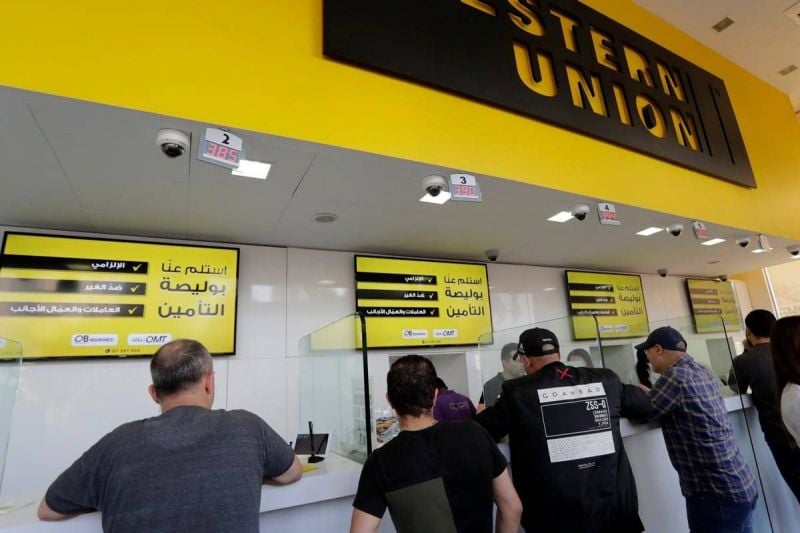
People gather at a shop that provides money transfer services in Beirut. (Credit: Anwar Amro/AFP)
Banque du Liban authorized all money transfer companies to process foreign exchange transactions, provided they meet certain conditions. The text in BDL Circular 614 will be applied from the date of its publication, which was Monday. Since October 2021, only OMT, Western Union’s representative in Lebanon, has been allowed to offer this particular service. OMT publishes the applicable exchange rate daily (which is different from the one determined by the Sayrafa platform operated by BDL). BDL has not specified which exchange rate will be applied under the terms of the new circular. The latter sets several conditions of eligibility, including a capital requirement for every money transfer company to set aside LL500 million per branch — 50 times the amount that was previously required. Money transfer companies will have until June 30 to comply with these conditions. Foreign currency is sorely sought after in Lebanon, as the local currency has severely depreciated and some commodities, such as diesel, which is essential to keep generators running, require dollars. Many residents have complained that shops, even smaller ones, are increasingly demanding dollars for their products and services.
Coronavirus restrictions will be eased following a drop in case numbers, Health Minister Firass Abiad announced yesterday. However, speaking at a meeting of the national commission responsible for monitoring COVID-19 cases, he did not specify which preventative measures he was alluding to, nor when the public could expect the loosening of restrictions to begin. After the holiday period at the end of last year, during which time cases exceeded 10,000 per day, Lebanese authorities had imposed several restrictive measures to contain the spread of the virus, such as the required presentation of a vaccination certificate in various enclosed public spaces and workplaces; however, these measures were not always applied in practice. Abiad did issue a warning that, despite an increase in vaccination helping to slow the spread of the virus, “the pandemic is not over and new variants will appear.” He also highlighted that 67 percent of people infected in the past two weeks were not vaccinated. Lebanon registered 3,978 new COVID-19 cases yesterday. Eighteen people died, raising the death toll to 10,007.
Lebanon has been classified as an “authoritarian regime” for the first time ever in the Economist Intelligence Unit’s annual Democracy Index. The Democracy Index ranks each country’s performance in five categories: “electoral process and pluralism,” “functioning of government,” “political participation,” “political culture” and “civil liberties.” Lebanon’s three-place drop in rank can be attributed to its considerably lower score in the “functioning of government” and “political culture” categories, as its scores in other categories remained stable. Previously designated as a “hybrid regime,” Lebanon tied with Burkina Faso in 111th place this year. The country’s latest classification is a far cry from its place in Democracy Index’s 2006 ranking, its first, when Lebanon scored a lofty 5.82, which declined to 4.16 in 2020 only to slide into its first “authoritarianism” descriptor when it fell to this year’s all-time low of 3.84.
Hezbollah’s political council chairman Ibrahim Amin al-Sayyed yesterday described the upcoming parliamentary elections as “a political July war.” Sayyed uttered his unambiguous reference to the 2006 war against Israel during a rally in northern Bekaa. “Americans, Israelis and Europeans want [our] arms, resistance and society, in order to have a Parliament that can elect a president who will form a government that will act as they want,” he said. Sayyed also claimed that parties are offering voters in the parliamentary elections bribes ranging from “$50 to $100.” Meanwhile, former Interior Minister and Future Movement MP Nohad Machnouk announced that he will not run in elections. “I announce today that I will not run for the next parliamentary elections, but I will remain a soldier that defends Beirut,” Machnouk said in a statement. Machnouk, among other MPs and former ministers, has refused to appear for questioning in the port blast investigation led by Judge Tarek Bitar. To be granted permission for prosecution, Parliament must agree to lift the MPs immunity.
Former Prime Minister Fouad Siniora will deliver a press conference today, but he is not expected to announce his candidacy in the upcoming parliamentary polls. However, many believe that he will define the criteria for Sunni candidates and present his position on the current political developments in order to gauge reactions before deciding whether to run. According to information obtained by L'Orient-Le Jour, Siniora met with Future Movement leader Saad Hariri in the UAE, where Siniora told the former premier who recently announced his withdrawal from political life that he had already started to form an electoral coalition. Meanwhile, Nawaf Salam, former ambassador and permanent representative of Lebanon to the United Nations, told L’Orient-Le Jour that he has not decided whether or not he will run in the elections. Salam, who serves as a judge in the International Court of Justice, and whose name was once floated as a potential prime minister, occupies a unique space in the Sunni political landscape as he has managed to garner support from both opposition parties and a part of the traditional political class, as well as the West and Saudi Arabia. If he decides to throw his hat in the ring, he will likely run in the Beirut II electoral district, where Hariri’s withdrawal created a huge void.
In case you missed it, here’s our must-read story from yesterday: "Lebanese Communist Party's upcoming internal elections highlight divisions over Hezbollah, electoral alliances"